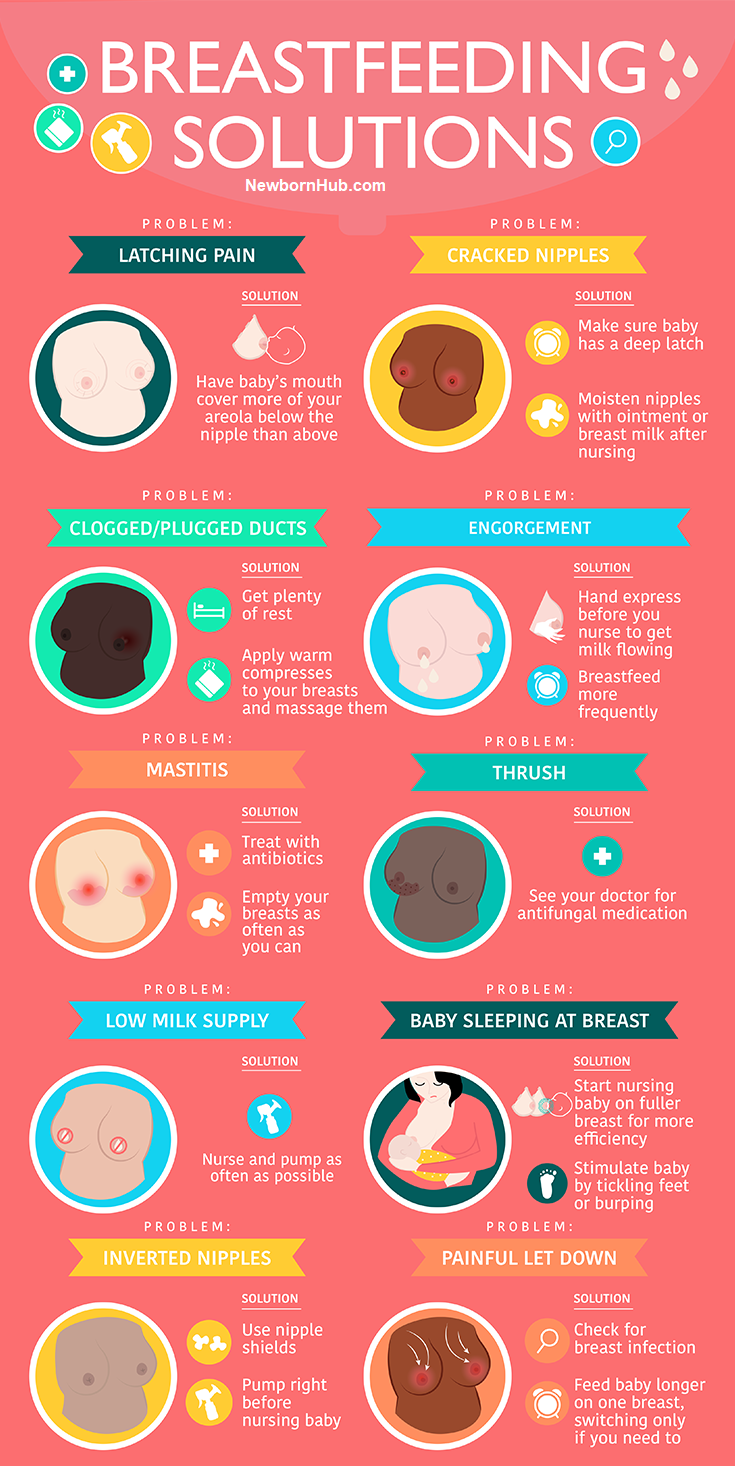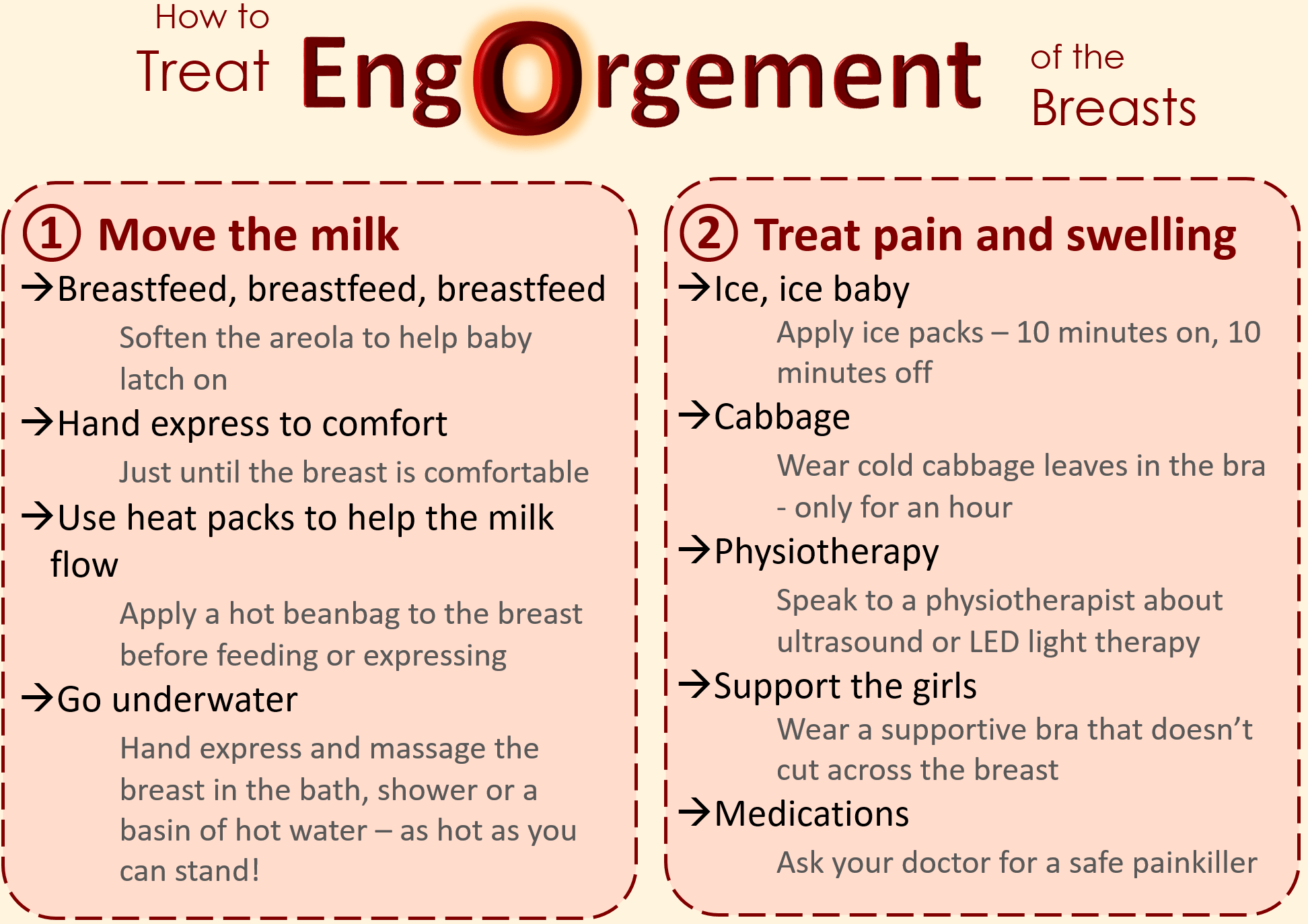- HOME
- Breastfeeding
- Breastfeeding Problems and Solutions
Breastfeeding Problems and Solutions
In this section - Breastfeeding Problems and Solutions:
Common Breastfeeding Problems and Solutions

Breastfeeding is a no doubt a very beautiful, natural and healthy process for both mother and her newborn, yet every good thing comes with a price. Breastfeeding may seem as a "free" option for most of the non-breastfeeders (I think I just made up this term), yet it has its ups and downs (not to mention sometimes the expense on buying breastfeeding accessories). Yes, she does get some relief from the financial tension of purchasing formula milk, bottles and sterilizers; but the pain and discomfort that, at times, mothers go through cannot be ignored.
Problem # 1: Cracked Nipples
Also referred to as sore nipples, the cracked nipples are one of the leading breastfeeding problems and can be the result of many things. You may experience frequent sore nipples if you have just started breastfeeding. Nipples are made up of very delicate tissues, and improper positioning/ latching may end up making them sore and bleed. Cracked result can also take place due to a improper pumping, shallow latch or dry skin.
The solution is to make sure your newborn baby has a correct latching position. When your baby has a shallow latch, your nipple is present in front of the tiny mouth and it rubs along the hard palate of your baby's mouth. When you have a deeper latch, your nipples go deeper inside the mouth where the palate is soft and it does not cause friction.
How to heal cracked nipples?
If you have a bleeding nipple, discontinue feeding your baby from that breast for a while until the nipple heals. To heal the nipple, apply some of your breast milk on the nipple and let it air dry. You can also use a soothing gel pad, nipple shield, or a nursing ointment to help relieve the pain and heal the cracked nipples. Since bacteria can find a place to live in the cracked nipples, make sure you wash your breasts with a mild soap and lukewarm water twice a day or after every feed.
- An ideal healer is the breast milk itself – squeeze out a couple of milk drops from your breast and apply it on the affected area. This is something that is proven to be a miracle healer.
- Apply warm and wet tea bags for 10 - 15 minutes on the sore nipples right after breastfeeding. It tends to be very soothing for the mother.
- Ask your doctor about a good ointment that you can use on your cracked nipples.
- Frequently change breastfeeding/ nursing pads if you use them. Also, make sure the bra you wear is of the right size, and is not to tight. Click here for a look at breastfeeding accessories you may want to have.
Remember, your baby did not hurt your nipple purposely, so blaming and scolding your infant is not the solution to your breastfeeding problems. Sometimes baby blues may make you think stuff that you would never think otherwise. It is quite natural to feel low, cranky and depressed after delivery - even weeks after the delivery. This may be a sign of postpartum depression. Talk to your doctor about your mood swings or low energy level.
Problem # 2: Low Milk Production
In your initial breastfeeding days, the breastmilk may appear to come in little quantities. This results in you and your newborn baby both trying hard to get the milk out, which cause the delicate nipple tissues to crack and bleed.
Since this is a very important subject that the new breastfeeders (did I also make this term up? ) want to know about, we have a separate section on it. It is one of our most read section so you would not want to miss it, would you? Click here to find the 8 effective ways to improve the flow and quality of your breast milk.
Problem # 3: Engorgement
When your breasts have a very high amount of milk than what they are supposed to have, they bulge out and feel sore, swollen, hard, and ready to burst! This makes it hard for the baby to latch on, and is also quite uncomfortable and often painful for you too. Engorged breasts are tender to touch and if untreated, they may lead to other issues including clogged milk ducts. Breast engorgement can happen due to one of the following factors:
- Your breasts may feel engorged when you are new to breastfeeding and the body is still figuring out how to properly regulate the milk.
- If you miss a breastfeeding session or take too long between the feeding sessions, your breasts may get engorged.
- Your breasts may also face engorgement if your baby is not properly draining the breasts.
Solution: How to cure and prevent breast engorgement?
- Hand-express some milk before each feeding when your breasts seem engorged. This way your baby will be able to latch on properly, and the milk will start flowing easily at the time of breastfeeding.
- Do not pump. Pumping is a way to tell your body to produce more milk due to higher demand. That's not the case here. Instead, nurse your baby as often as you can and make sure both the breasts are completely empty. If the breasts still feel full after a breastfeeding session, it could be a sign that your baby is not drinking enough or properly. Consult your doctor and discuss your concerns.
- Use a warm compress before the feeding to soften your breasts up and start the let-down process. But do not prolong the heat compression, otherwise your breasts will can have swelling and inflammation.
- Once you are done with feeding your baby and still feel uncomfortable, put a cold/ ice compress to reduce the inflammation. Putting some icy cold cabbage leaves on engorged breasts also help to reduce the pain and swelling.
- If you plan to be away from your baby and miss a feeding session, try pumping so your breasts don't end up being engorged. You can use a manual breast pump as it is easy to carry in your handbag.
- Do not forget to drink plenty of water to keep your body hydrated and prevent any sort of traffic jam in your milk ducts.
Problem # 4: Biting Baby
Not all breastfeeding problems are encountered at the beginning. Some of them appear even when you feel that there is nothing more convenient than breastmilk.
Babies love biting - they really enjoy it. Give them a ball, they will try to bite it really hard. Give them the TV remote and they will chew off a button or two (or even more)! Give them your breast, and again, they will love to bite it! And many babies seem to enjoy their mother’s reaction upon biting. As if it’s some kind of a game – they bite and mommy screams. This game of action-and-reaction may sound like fun to your baby, but for you, it sure is a very painful experience.
Solution: How to stop a biting baby?
- First of all, no matter how little your baby is, he needs to be taught the meaning of “No”. He bites you and you tell your baby “If you bite, no milk for you” and stop feeding for sometime. At first your baby may not understand it but sooner or later, he would realize that when he bites, he gets deprived of breast milk. Make sure you tell him to stop biting with a stern face – it is something that hurts you and you need to communicate this to your child.
- If you feel that you are feeling constant pain in the nipple that was bit by your baby, consult your doctor. It may end up catching an infection and your doctor may have to prescribe you some medicines to cure it.
- Many babies bite because they are in pain during their
teething days. Make sure you use pain relieving ointment or a home
remedy like using cold spoons and ice on gums to soothe them. For
details on providing relief to your teething baby, read our article on Baby Teething.
Problem # 5: Leaking Breast Milk
This is a mother's nightmare - wearing the perfect outfit at the most awaited event of the year and the dripping starts!
Many many years ago when I was a little girl (okay not that much of a many) and had absolutely no idea about the technicalities of breastfeeding, I attended a cousin’s wedding. While enjoying my tea in a group of somewhat ten people, I suddenly noticed that the lady sitting in front of me has dripped some liquid on her pretty silk blouse. As a reflex, I offered her a napkin and told her about the spill. She suddenly got embarrassed in front of the whole group and excused herself away. Everyone started looking here and there sheepishly until an aunt of mine shook me by my elbow and slightly whispered in my ear something that I did not get at that time, but I do now! The spill on the lady’s blouse was not a beverage; it was the leaking breast milk.
*Drip Drip*
Causes of leaking breasts:
A leaking breast is not a strange concept in a mother’s world when she is breastfeeding her baby. In fact, it is one of the most common breastfeeding problems. There are many reasons why the breast leaks.
- Sometimes the breast has produced too much milk that it starts overflowing.
- Many a times, just the thought of your baby may cause your breast milk to dribble.
- At times when you are breastfeeding your baby from one breast, the other one starts to pour out its offerings.
What to do if you are leaking breast milk?
- Use breast pads. If you are going out, always wear breast pads as you never know when the breast starts to trickle. This is something you do not have any control over, so be prepared for it. Read more about breastfeeding accessories here.
- An overflowing breast tells us that we need to breastfeed our baby as the milk has reached its maximum capacity level – so keep on breastfeeding your baby at short intervals to avoid your breasts becoming full of milk and overflowing. You can also express and store some breast milk for future use. But make sure you don't over express it as the more you keep on expressing, the more will the breasts generate milk.
- Washable plastic breast shells can come handy if your breasts overflow a lot. You can sterilize these breast shells and the milk that gets collected inside these shells can then be reused.
- When feeding your baby from one breast, make sure you put a little towel or soft cloth under the other breast. Make sure you regularly change your bras and breast pads as you would not want to get sore breasts and any sort of infection.
- And here is an important tip: always wear clothes that can camouflage the dripping milk. If you wear fabrics and colors that can be easily stained and they stand out in the crowd, stop!! The last thing you would want in a public gathering would be people looking at your breasts and chuckling away. Normally stains are prominent on silks and clothes that are of a single color/ shade.
- If you are at a party and have left your baby at home with a nanny or caregiver, stop thinking about your baby. It may seem hard, but really, stop it. The more you think about your baby, the more will be the chances of you having a breast leak.
Problem # 6: Interruption in sleep
This is one of the common breastfeeding problems that moms face.
When I started to breastfeed my daughter, I was very much disturbed by the interrupted sleep routine that I had to go through due to my newborn’s bizarre breastfeeding schedule. Though it was not one of the direct breastfeeding problems, it ended up in a lot of frustration. I would fall asleep only to be awakened by a crying baby demanding breast milk. This made me realize what a troublesome experience breastfeeding was - an absolutely insane perception!
But I wasn’t the only mother who used to get such feelings. A majority of first-time moms deem breastfeeding difficult in their early couple of weeks. Soon, all of them get the hang of it. So, if you are a new mother who is worried about breastfeeding problems and the discomfort that breastfeeding gives you at night and the sleep deprivation it causes, don’t worry. Soon it will become a routine for you and you could easily sleep through the night even with your little one getting his normal feeds.
Cosleeping makes breastfeeding easy as the mother can sleep while nourishing the baby - talking about and multitasking! Learn more about co-sleeping by clicking here.
Click here to enter our baby sleep section to get all the help you need to make your newborn baby sleep through the night. If your baby has a proper sleep routine, you will end up having a fresh baby and an even fresher you!
To Sum up - Breastfeeding Problems and Solutions

Prevention is better than cure, so make sure you know how to avoid breastfeeding problems. This way, you won't have to worry about finding the solutions of your breastfeeding problems.
Every problem has a solution; and same goes with breastfeeding problems. If you have already nursed your baby and are having difficulty in stopping the breastfeeding process, refer to our article on How to Stop Breastfeeding. You can also choose to extend this time. Read also: How long should you breast feed for?
Remember, the benefits breastfeeding brings clearly outweighs all the breastfeeding problems. Period.
Return to Breastfeeding section.
Go to Homepage.
See Also:
- How to breastfeed a newborn?
- Breastfeed vs bottle feed
- Breastfeeding and pumping
- Breastfeeding problems and their solutions
- How long should women breastfeed for?
- Breastfeeding tips
- How to increase breast milk?
- When should you not breastfeed?
- Why should you breastfeed?
- Foods to eat & foods to avoid when breastfeeding
- What accessories do I need when breastfeeding?
- Breastfeeding advantages for mothers




New! Comments
Have something to say about what you just read? Leave me a comment in the box below :)